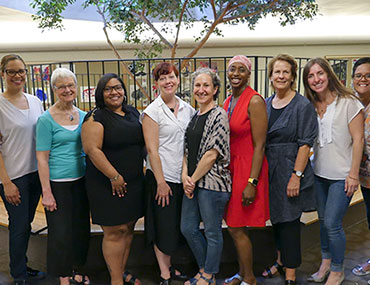Earlier this year, the Bank Street Education Center conducted an early childhood review of New Haven Public Schools in Connecticut to help assess early childhood practices, resources, and supports within the district’s Head Start, School Readiness, and public magnet school pre-k programs. The five-month process led to the creation of a set of recommendations designed to help inform the school district’s early childhood approach and support the improvement of classroom practice.

The multi-phase project was designed in partnership with the district’s central office and the Education Center to provide New Haven with a structured approach to exploring the current state of instructional practice through the lens of one essential question: How do current resources, practices, and supports align to developmentally meaningful, play-based, trauma-informed approaches to learning? Throughout the project, the Education Center worked collaboratively with educators and administrators from New Haven, the Graduate School of Education, and the Center for Emotionally Responsive Practice, as well as several Bank Street alumni.
“At the Education Center, we know that to be successful, it is critical that we both develop a true partnership with the school districts we support and that we tap into the knowledge that lives within the institution,” said Davia Brown-Franklyn, GSE ‘97, Senior Director of Partnerships at the Bank Street Education Center and lead on the New Haven project. “Access to different perspectives from different community members made the entire collaboration much more powerful. It allowed us to think about how we can respectfully bring our practice to the outside world.”
The Education Center’s work leveraged Bank Street’s deep understanding of how children develop emotionally, socially, and cognitively to create and execute a carefully designed diagnostic review of the district’s early education practices. In partnership with New Haven team members and Graduate School faculty and alumni, the process included a deep dive into the district’s data and supports through document review, classroom visits, interviews with central office staff, educators, parents, volunteers, and community partners, and an analysis of the observations, information, and reflections collected. The work culminated in the creation of key learnings and recommendations to help inform next steps within the district’s early education programs.
Participants began with a visit to the School for Children to try out a classroom review tool and protocol designed for New Haven. During the process, team members got to know each other better, gained a deeper understanding of what it means to make low-inference observations, and developed new insights on how to debrief a classroom visit with an unfamiliar partner.
Once on-site in New Haven, each Bank Street team member paired with a staff member from the district’s central office for classroom visits, interviews, and reflection activities. The process was designed to build from the strengths that already exist within the district and provide opportunities for everyone involved to learn together about what is working and what needs to be improved in New Haven classrooms.
Nancy McKeever, GSE ‘76, acting chair of the General Teacher Education Department for the Graduate School, lent her expertise on early childhood development and qualitative research to the project. She partnered with Allyx Schiavone, GSE ‘94 and current Executive Director of the Friends Center for Children in New Haven, to observe and reflect on classroom practice in the district’s early education classrooms. “New Haven has a deep history with Bank Street—going back to our work together as part of Project Follow Through in the 1970s and 1980s. This project provided an exciting opportunity to leverage my background in research and evaluation while continuing to help improve early childhood practices in the New Haven community,” McKeever said.
The Education Center is currently working with New Haven leadership to identify next steps in this project. Recommendations included deepening collaboration with key stakeholders to develop a clearly articulated vision for early childhood classrooms across the district; creating a plan for implementing a district-wide vision through pre-K curriculum, assessment supports, and aligned professional learning expectations and structures; and strengthening relationships with families and existing community partners to embed best early childhood practices and build capacity district-wide.
The Education Center’s team members are excited to continue collaboration with Bank Street faculty and educators and would like to encourage others who are interested in learning more about their work to reach out. “The more we work together, the more we can bring our practice to the outside world. In a way, the Center’s work is the lived experience of Bank Street beyond the walls of our school—together we get to see what we do well play out in classrooms beyond Bank Street and help others who may not have the same access or resources that we do,” said Brown-Franklyn.
For more information on how to work with the Bank Street Education Center, please contact Doug Knecht.
The Bank Street Education Center team would like to thank the following Bank Street faculty and staff for their dedication and support during this project: Noelle Dean, Gabriel Guyton, Nancy McKeever, Betsy McKenna, Kristina Satchell, GSE ‘13, and Shannon Vazquez.